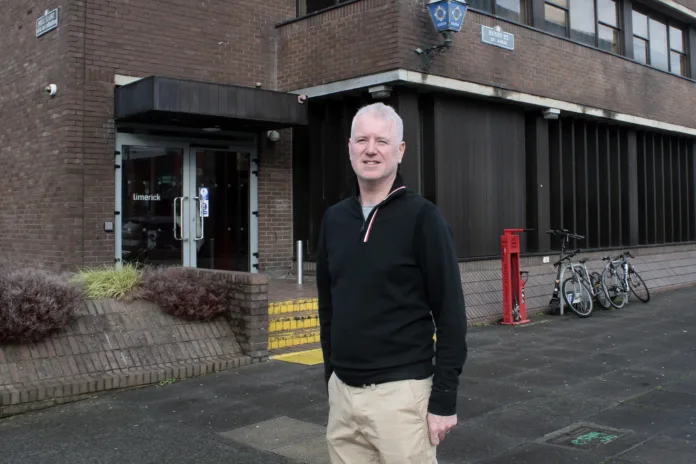
BECOMING a member of An Garda Síochána was never part of the plan for Roscommon native John Finnerty, but when he was stationed at Henry Street Garda Station in the heart of Limerick City over 30 years ago, it marked the beginning of a long and successful career on Shannonside.
In the first decade of his career, John was placed on the front lines at one of the busiest Garda stations in the country.
He was also tasked with the protection of State witnesses, armed patrols of the city, and investigating serious crimes and homicides, including during Limerick’s notorious gang feud. Among his most impactful memories is witnessing seven fatal traffic collisions.
Mr Finnerty said he quickly became acquainted with the courts system during his time at Henry Street, and later as a at Bruff Garda Station, explaining that he could be called to attend or give statements at the courts several times a week.
“The first year or two when I was going into court, I had no idea what was going on. It took a long time to understand what was transpiring in court because the case would be called and, before you knew it, the case was over and you’d be wondering what happened,” he recalls.
“There’s a lot of legal language that you have to learn and understand and it’s not something that you learn in the first couple of weeks. It took me a long time to learn what was going on.”
This is a challenge not just for Gardaí, the now retired Garda said, but also for civilians finding themselves required to give evidence before the court.
“If you are a victim of crime and you come into us, we take a report and investigate it. But in order to arrest somebody and bring them before the court, we have to prove that case beyond all reasonable doubt, which is a very high threshold. A lot of people don’t really fully understand that,” the former Garda said.
Pressure in the dock
Due to the hectic nature of the job, John revealed that it wasn’t always possible to explain this process and the court system to people. Reflecting on his time in the force, he believes a programme to explain the legal system and what people can expect before they go into court would be beneficial for both victims and witnesses.
“Some people would be absolutely terrified because they’ve never given evidence in court before, and now all of sudden they are in the witness box being cross-examined by a solicitor, that’s really difficult for people,” he said.
The courtroom also impacted much of the former Garda’s working life, often finishing a night shift at 6am only to return to bring an accused to court a few hours later.
During night shifts, which began at 10pm, John and his colleagues could be out on patrol five out of seven nights of the week, where John says they would usually arrest at least one person during a shift.
However even one arrest could mean a long day in court for Gardaí who may have numerous defendants from different cases appearing the same day.
Gathering CCTV footage is also of critical importance for any case before the courts, he said, but using the footage to prove a matter beyond all reasonable doubt can, again, sometimes be a difficult task.
“Sometimes you could go to a shop or a house and the CCTV isn’t that great. You really need high quality CCTV to be able to use in court because solicitors could then question if it is their client or if it looks like them, so it’s really important,” he said.
‘You can’t become emotional about it’
However the life of a Garda is anything but predictable, so preparation was key for John, working on cases a couple of days in advance of court appearances.
“You might start at six and think ‘I have plenty of time to get ready’ (for court), but then there could be a serious incident and all of a sudden you’re out in Castletroy or somewhere preserving a scene until half nine, and there goes the time to prepare,” he said.
Attending the scene of serious incidents can be a traumatic experience for Gardaí, but John said “you can’t become emotional about it”.
“It could be a young person, someone who is elderly or even someone that you know personally, there are pretty gruesome scenes and it is difficult to deal with.
“In most of those cases, you are down in court again with somebody charged with either reckless driving, endangerment, or dangerous driving causing death.”
John points out that, thankfully, supports such as counselling for Gardaí are now in place, unlike 30 years ago when he started out in the force.
“There is a perception that Gardaí are robots, but we’re not. We are human beings that have emotions just like everybody else,” he says.
Throughout his career, the former Garda also served on the frontlines during intense gangland feuding across the city. But despite the challenges, he says the city was provided with “great leadership” by An Garda Síochána.
In particular, John paid tribute to retired crimefighter Gerry Mahon, who helped oversee the restoration of peace to Limerick City during the mid-2000s.
However the gang feuds, which led to prominent cases in courtrooms in Limerick, have become increasingly prevalent once again in headlines in recent times, with concerns mounting of rising tensions locally.
When asked if there are concerns among Gardaí about resurgence in the feuding, John said there is always a possibility that feuding could kick off at any time, but his colleagues can find “comfort” in the fact that there are now 24-hour armed Gardaí “who will respond within seconds to an incident”.
“30 years ago we didn’t have armed support units or regional support units,” he explained. “The only Gardaí who were carrying firearms were appointed detectives.”
Talking the talk
Outside of the courtroom, John spent the last five years of his career conducting public speaking workshops for members of the force, sharing skills he learned after joining his local Toastmasters public speaking group in 2017.
He has since created a learning programme for members of the force, training Gardaí to superintendent’s in public speaking across the entire country.
“Every single day in Ireland, there is a Garda speaking in court, or to the media, to our local communities, or a local radio station, so communication skills are vital. It’s very important for Gardaí to have that training.”
This aspect of his career is something John hopes to continue in his retirement as he settles into a new phase of life away from the Gardaí. He has also started a course in sport and performance psychology in Dublin one evening a week.
Reflecting on his 30-year career, John said the years went very quickly, and considers himself lucky to have “enjoyed most of the days and nights” on duty.
He said becoming a Garda affects all parts of a person’s life, sharing that once he told people about his job they would “look to you, they see you as serving the public in a frontline capacity, and to provide leadership within the community. So I think it’s different in that respect from a lot of other jobs, but I would certainly encourage anyone who is thinking of joining the Gardaí to take it up.”
– Court Reporting Scheme


